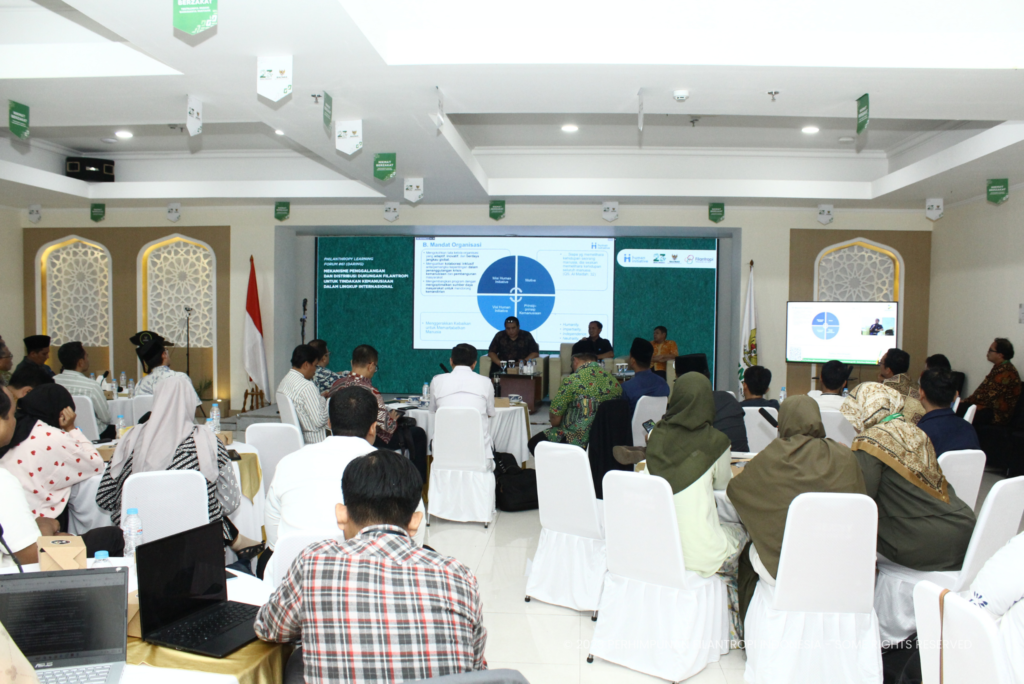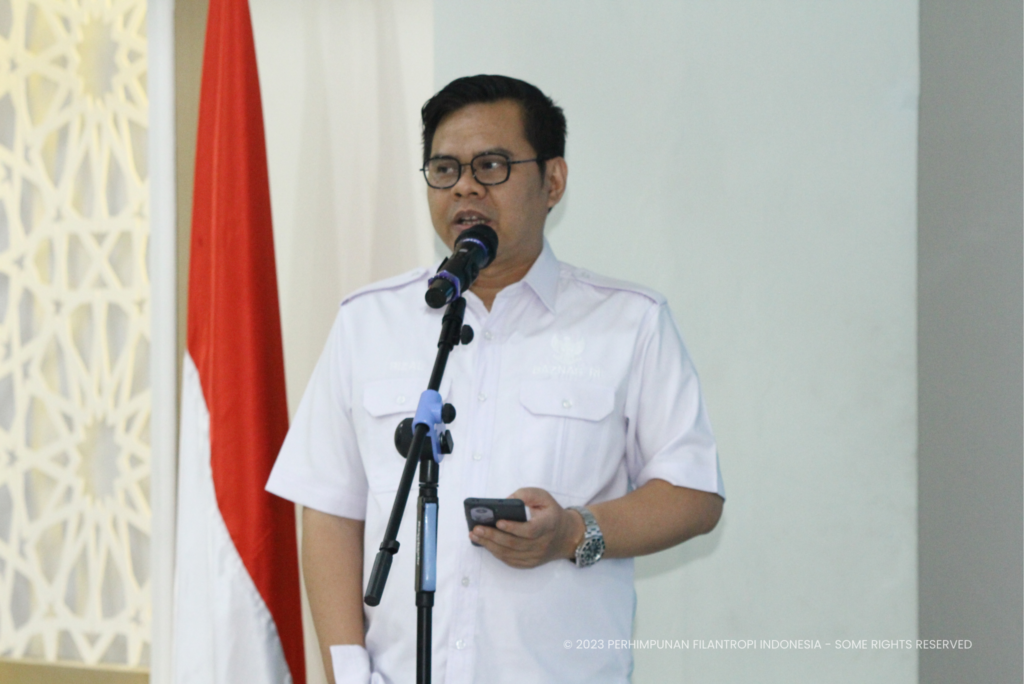Deliberation on Mechanisms for Raising and Distribution of Philanthropic Support for International Humanitarian Action

Filantropi Indonesia, in collaboration with BAZNAS RI and the Human Initiative, organized Philanthropy Learning Forum #61 on the topic, ‘Mechanisms for Raising and Distribution of Philanthropic Support for Humanitarian Action in the International Scope’ at the BAZNAS office in Jakarta on February 13, 2024. This event aimed to share strategies and best practices adopted by philanthropic institutions to mobilize support internationally. Additionally, the forum aimed to gather inputs for strengthening the mechanism for raising aid for international humanitarian action.
According to the Indonesia Philanthropy Outlook 2022, one of the areas of progress in the philanthropic sector is expanding the reach of philanthropic activities. Philanthropic institutions are no longer restricted to working solely within their domicile areas but have grown to national and international scales. There is a heightened focus on international philanthropic activities, particularly in the context of humanitarian action. In 2023, several philanthropic contributions were recorded for earthquake relief in Turkey, Japan, and Morocco, followed by the flood response in Libya and, most recently, the response to war survivors in Palestine.
During his opening remarks, Prof. Dr. KH. Noor Achmad, MA, Chair of BAZNAS RI, emphasized the need for a systematic classification of aid for foreign countries affected by disasters, war conflicts, refugees, and war areas. He further emphasized that the channeling and distribution of aid abroad should be jointly coordinated through multi-party partnerships. In this regard, he asserted that the Ministry of Foreign Affairs (Kemenlu RI) is the institution that has the right to coordinate aid. He stated, “In our opinion, who is coordinating? This is the Ministry of Foreign Affairs, so all the assistance we provide overseas, whether for disasters, for refugees, for wars where there is conflict, or for the extreme conflict currently occurring in Gaza, needs to be coordinated by the Ministry of Foreign Affairs.”
Gusman Yahya, Executive Director of Filantropi Indonesia, highlighted the importance of sustainable development and humanitarian processes. He pointed out that philanthropy is extensive and reaches all provinces in Indonesia and even internationally. He stated, “This can show that our principle of mutual cooperation as a nation always helps our brothers and sisters who are in need, not only at home, but also in other countries.” Yahya further emphasized the need for strengthened coordination and organized mechanisms to make collaborative efforts more impactful and organized.
Andreas Hapsoro, Director of the Habitat for Humanity Indonesia Strategic Alliance, highlighted that Indonesia experiences approximately 2,500 disasters yearly. However, he asserted that caring and wanting to help is not limited to people at home but manifests in humanitarian actions abroad. Hapsoro stated, “This shows Indonesia’s generosity as the most generous country in the world.”

During a presentation, Nelwan Harahap, S.P., M.Tr. A.P., Assistant Deputy for Emergency and Post-Disaster Management at the Coordinating Ministry for Human Development and Culture highlighted the importance of aid as a tool for soft diplomacy. Harahap emphasized the need for multi-directional communication among government, philanthropy, and other stakeholders regarding data or information that is used as the basis for collecting resources and distributing aid within or outside the country. Harahap suggested adjusting regulations that accommodate community participation to increase domestic resources while prioritizing generosity, accountability, transparency, ethics, and morals with a humanitarian spirit. He also stressed the need for positive policies encouraging people to donate, which would require reviewing and adapting licensing policies to the current situation.
Tomy Hendrajati, President of the Human Initiative, representing philanthropic institutions and humanitarian activists, identified two main challenges philanthropic institutions face: raising and distributing international aid. According to Hendrajati, regulation is the primary challenge in raising international aid, particularly Law No. PUB. 9/1961 needs to be refreshed for current conditions, including permission to raise funds for foreign assistance. Hendrajati also suggested enforcing a code of ethics to strengthen accountability and public and donor trust. To make it easier to raise and distribute international aid, Hendrajati proposed five recommendations: having a coordination and collaboration platform for key stakeholders, increasing the capacity and accountability of institutions, educating the public, localizing with local organizations, and building a solid philanthropic ecosystem by encouraging the refreshing of fundraising regulations and implementation of assistance for the sustainability of philanthropic activities in Indonesia. These actions can offer a solution to humanitarian funding challenges.
Rizaludin Kurniawan S.Ag, M, Si, CFRM, Head of the BAZNAS RI Collection Section, supported strengthening the institution’s capacity in planning, implementing, and reporting fundraising. Another crucial aspect is operational fundraising for international aid, which is set at cost and a maximum of 5% through a decree by the Chairman of BAZNAS. BAZNAS hopes for a role from the government, especially the Indonesian Ministry of Foreign Affairs, in coordinating the raising and distribution of international aid, resulting in one-stop communication or, if needed, support from philanthropy.


Bambang Suherman, the Chair of the Zakat Forum and Director of the Dompet Dhuafa Program, highlighted the crucial need for a standardized coordination mechanism and the presence of the government as the central authority in managing humanitarian aid efforts. The Ministry of Foreign Affairs was identified as a suitable entity to lead these efforts. As part of a proposed mechanism, Bambang suggested incorporating adaptive strategies that account for the dynamic nature of field operations and reporting procedures that ensure accurate record-keeping of aid distribution. Moreover, he emphasized the need for effective schemes that encourage community participation in supporting aid collection. Bambang proposed establishing a pooling fund strategy that encompasses not only monetary resources but other relevant resources as well, based on a comprehensive stakeholder mapping to facilitate aid logistics coordination.
Similarly, M. Ali Yusuf, the Chair of the Indonesian Humanitarian Alliance (IHA) Committee, emphasized the importance of a thorough understanding of fundamental humanitarian principles and the public’s understanding of impactful support. Therefore, he emphasized the need to develop a mechanism that facilitates community generosity through philanthropic and humanitarian institutions to acquire optimal funding support. Furthermore, institutional mechanisms and the development of strategic and operational-technical aspects in distributing support are critical to ensure that Indonesian humanitarian aid efforts at the global level are relevant, efficient, effective, accountable, meaningful, and impactful. In conclusion, he suggested that the Humanitarian Framework Document (K3I), currently being prepared by the Indonesian Humanitarian and Development Alliance (AP-KI), be used as a reference, along with the good practices from the IHA.

